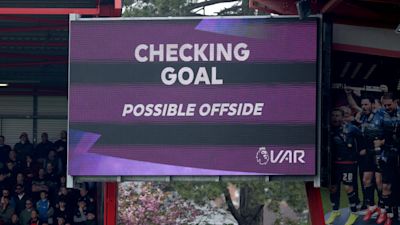Football chiefs discuss expanding VAR powers to include free-kicks, corners and second yellow cards

By Ben Bason, ITV News Production Journalist
Football chiefs have been discussing developments in VAR at a meeting today, with reports they have been considering expanding its powers in the game.
The International Football Association Board (IFAB) held its Annual Business Meeting at Heathrow and it is thought they debated whether the use of a Video Assistant Referee (VAR) should include free-kicks, corners and yellow cards going forward.
The technology has been controversial since it was introduced in the Premier League in the 2019-20 season, with several high-profile incidents where decisions have been questioned recently.
The delays caused by VAR decisions have also extended the amount of additional time played in many games, prompting fears this could be increased further if VAR powers are expanded.
Who are the IFAB?
The International Football Association Board (IFAB) is the only body authorised to decide and agree on changes to laws of the game.
It is comprised of the four British football associations (England, Scotland, Wales and Northern Ireland) and FIFA, which covers the remaining 207 national associations across the world.
Each of the British associations has one vote on motions and FIFA has four. Passing a motion requires a three-quarters majority of the board to agree.
Why were the IFAB meeting?
The IFAB has several meetings throughout the year - today was the body's Annual Business Meeting, which consults on proposed changes to Laws of the Game.
The meeting decided which topics should be dealt with at the Annual General Meeting (AGM), which is due to take place next Spring.
Any changes to VAR will therefore not be agreed until the AGM next year.
What measures were they looking at?
VAR developments were on the agenda at the IFAB's Annual Business Meeting.
The Times reports sources close to the board have said this will include a discussion on whether the scope of VAR decisions should be extended to include free kicks, corners and second yellow cards.
Currently the technology can only be consulted in so-called match-changing situations like goals, penalty decisions, direct red cards and mistaken identity.
It is reported a working group has been set up by FIFA to explore whether VAR's powers could be extended, with the aim of improving the accuracy of decision-making.
But critics worry the move could lead to time delays in games increasing.
Former Premier League referee Peter Walton told The Times he would be "vehemently against" widening the scope of VAR, saying it should should cause "minimal interference for maximum benefit."
What has the reaction been to VAR this year?
There have been several controversies over decisions made with the support of VAR this year.
The most high-profile was when Luiz Diaz's goal was wrongly ruled out for offside during Liverpool's 2-1 defeat to Tottenham in September, due to an apparent miscommunication between VAR officials and the stadium.
In an audio recording released of the failure official Darren England can be heard stating Diaz was onside but accidentally confirming the referee's original decision to disallow the goal.
Back in February VAR officials failed to overturn an offside goal scored by Brentford's Ivan Toney's to equalise against Arsenal.
The Professional Game Match Officials Limited later apologised to Arsenal for the errors in the VAR process which they said were as a result of "human error."
Only last night two penalties were controversially given against Wolves in their match with Fulham, with VAR not overturning either decision.
Wolves boss Gary O'Neil later told reporters he had spoken to the referee who had admitted the first call was wrong.
The string of questionable decisions has led to calls from some Premier League managers for improvements to the VAR process.
After the Luis Diaz controversy in October, England boss Gareth Southgate revealed he has never been a fan of the technology and would prefer just to accept referees' decisions.
Want a quick and expert briefing on the biggest news stories? Listen to our latest podcasts to find out What You Need To Know